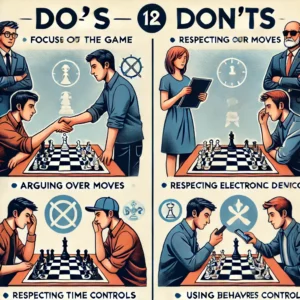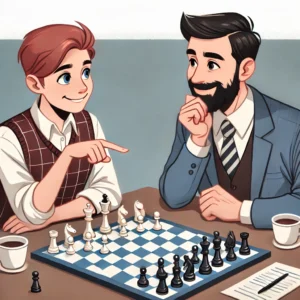Introduction

Chess etiquette forms the backbone of respectful and enjoyable gameplay, fostering an environment where players can compete with integrity and sportsmanship. Beyond mastering the rules and strategies of the game, understanding and practicing proper conduct enhances the overall chess experience for players of all levels. This guide delves into the essential do’s and don’ts of chess etiquette, emphasizing the importance of respect, fairness, and ethical play in every match.
Key Takeaways
- Essential Chess Etiquette: Learn fundamental behaviors that contribute to a positive chess atmosphere.
- Sportsmanship: Understand the significance of fair play, respect for opponents, and maintaining composure.
- Improving Gameplay: Implementing proper conduct enhances concentration and enjoyment during matches.
Do’s and Don’ts

Do’s of Chess Etiquette
- Respect Your Opponent: Treat your opponent with courtesy and acknowledge their achievements.
- Maintain Focus: Stay attentive during your opponent’s turn and avoid distractions.
- Offer Handshakes: Begin and end the game with a handshake, a gesture of goodwill and sportsmanship.
- Keep Track of Time: Manage your time efficiently to avoid unnecessary delays and respect the clock.
- Promote Fair Play: Follow the rules strictly and avoid any form of cheating or unsportsmanlike conduct.
Don’ts of Chess Etiquette
- Disturb Other Players: Avoid unnecessary noise or movements that can distract opponents.
- Make Unsportsmanlike Remarks: Refrain from making disrespectful comments or gestures toward your opponent.
- Touch Pieces Without Intent: Once you touch a piece, commit to your move unless correcting an illegal move.
- Argue Over Moves: Accept the decisions made by the players and avoid arguments during the game.
- Use Electronic Devices: Resist the urge to consult electronic devices during games, as it undermines fair play.
Proper Conduct During Matches

Maintaining proper conduct during chess matches is essential for a fair and respectful playing environment:
- Respect Time Controls: Adhere to time limits set for the game and avoid causing unnecessary delays.
- Handle Disputes Calmly: If a disagreement arises, discuss it calmly with your opponent or call for a tournament director.
- End the Game Gracefully: Whether winning or losing, accept the outcome gracefully and thank your opponent for the game.
- Avoid Distractions: Focus on the game and refrain from behaviors that could distract you or your opponent.
- Post-Game Analysis: After the game, analyze it respectfully with your opponent, if they’re willing, to learn from mistakes and improve.
Sportsmanship in Chess

Sportsmanship is integral to the chess community, fostering camaraderie and mutual respect:
- Celebrate Successes: Applaud good moves and successes by your opponent, acknowledging their skill.
- Learn from Defeats: Accept losses graciously and use them as opportunities for growth and improvement.
- Support Fellow Players: Encourage fair play and respect among fellow chess enthusiasts, both online and offline.
- Participate Actively: Engage in chess events and tournaments with a spirit of fair competition and respect for all players.
- Promote a Positive Culture: Uphold chess etiquette standards and encourage others to do the same, contributing to a welcoming chess environment.
Conclusion
Mastering chess etiquette not only enhances your gameplay but also contributes to a positive and respectful chess community. By practicing the do’s and avoiding the don’ts, players can elevate their chess experience and build lasting relationships with fellow enthusiasts. Embrace the values of sportsmanship, fairness, and respect in every game, ensuring that chess remains a rewarding and enjoyable pursuit for all.
Visit our website chesstacticshub.com for more in-depth guides and resources to help you master every aspect of chess strategy.
